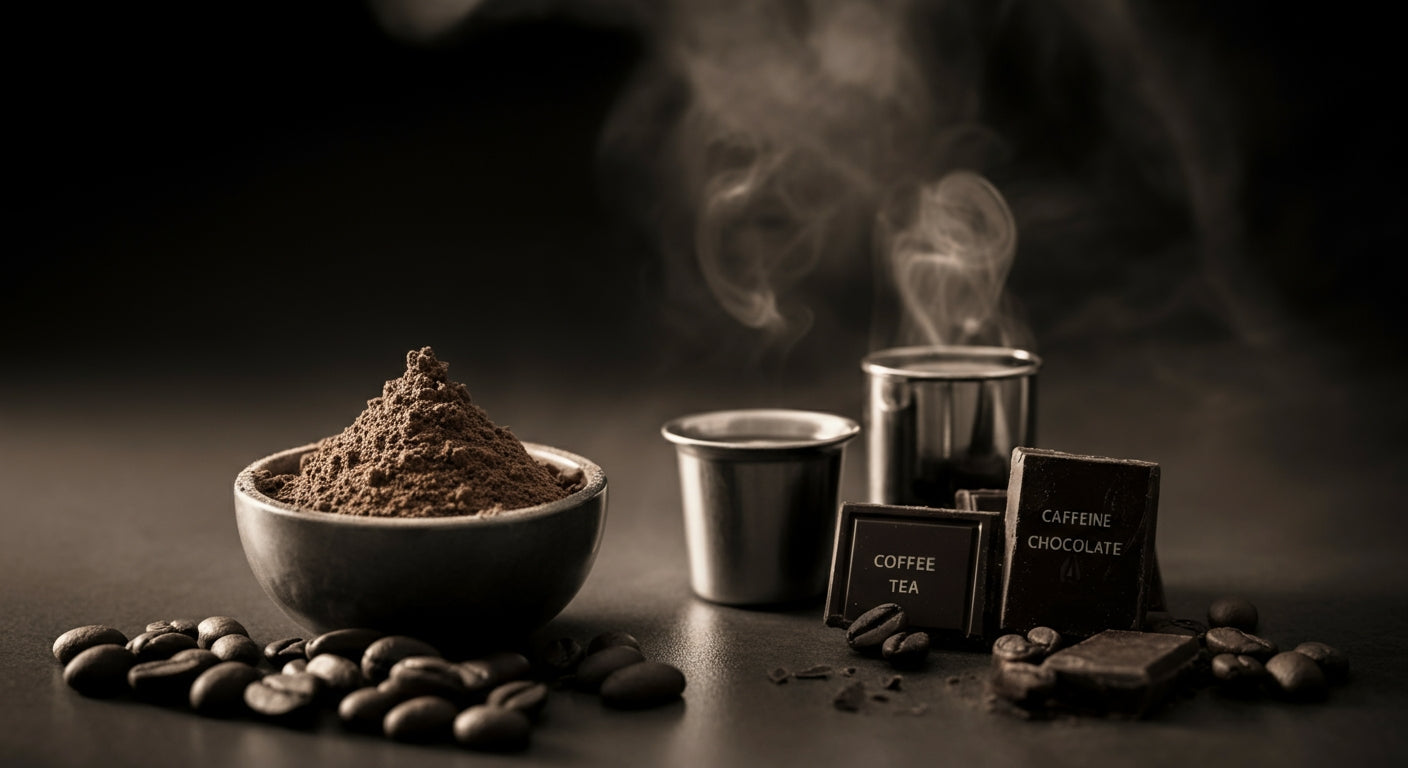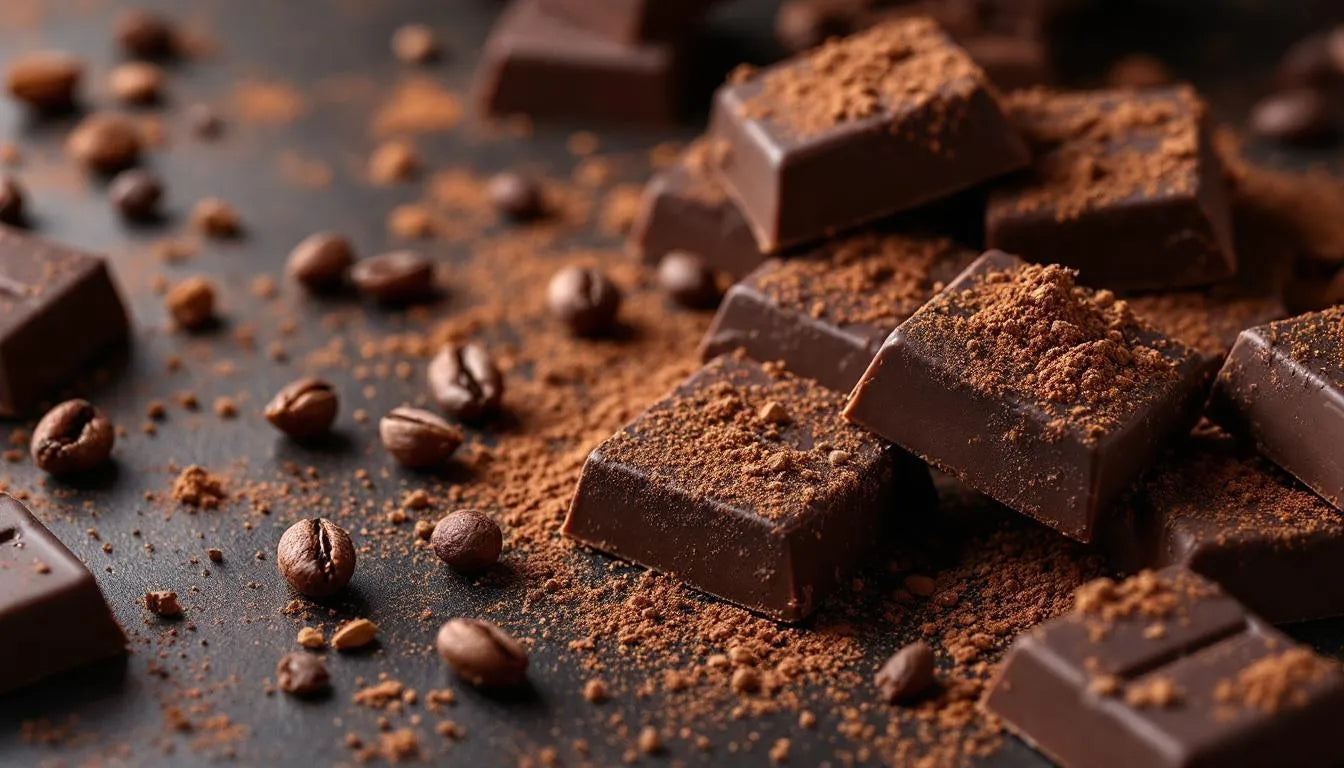
Does Cacao Powder Have Caffeine? Everything You Need to Know
If you've been wondering whether your favorite superfood contains caffeine, the answer is yes, cacao powder does contain natural caffeine. Raw cacao powder contains approximately 12 milligrams of caffeine per tablespoon, along with a unique compound called theobromine that creates a different energy experience than coffee. This natural combination provides sustained energy, mood enhancement, and focus without the jitters typically associated with high-caffeine beverages.
The Quick Answer: Yes, Plus So Much More
Cacao powder naturally contains caffeine because it comes from cacao beans, which are the seeds of the Theobroma cacao tree. However, what makes cacao special isn't just the caffeine – it's the unique blend of natural stimulants that work together to create a balanced energy experience.
Caffeine Content Breakdown
Per tablespoon (5g) of raw cacao powder: 12mg caffeine Per 100g of raw cacao powder: 230mg caffeine Typical hot chocolate serving (3 tablespoons): 36mg caffeine
Compare this to other popular sources:
- Coffee (8 oz): 95mg caffeine
- Black tea (8 oz): 47mg caffeine
- Green tea (8 oz): 28mg caffeine
- Dark chocolate (1 oz): 12mg caffeine

Why Cacao Powder Contains Caffeine
Natural Plant Defense
Cacao beans naturally produce caffeine as a defense mechanism against insects and to inhibit competing plant growth. This evolutionary adaptation means raw cacao powder retains these natural compounds when processed gently through cold-pressing methods.
The Cacao Processing Connection
Raw Cacao Powder: Maintains higher caffeine levels through minimal processing Processed Cocoa Powder: May have 20-30% less caffeine due to high-heat roasting Quality Matters: Our organic cacao powder preserves maximum natural caffeine through careful cold-pressing
Geographic and Varietal Differences
Criollo Cacao: Higher quality varieties often have optimal caffeine levels Growing Conditions: Altitude, soil, and climate affect caffeine content Harvesting Methods: Proper fermentation preserves natural compounds
Cacao's Unique Stimulant Profile: More Than Just Caffeine
The Theobromine Advantage
What sets cacao apart from other caffeine sources is theobromine – a mild stimulant that provides:
Longer Duration: 6-8 hours vs. 3-4 hours for caffeine Gentler Effect: Less likely to cause jitters or anxiety Cardiovascular Support: Dilates blood vessels and improves circulation Mood Enhancement: Promotes feelings of well-being and relaxation
Per tablespoon of cacao powder:
- Caffeine: 12mg (quick energy)
- Theobromine: 200-300mg (sustained energy)
Synergistic Effects
The combination of caffeine and theobromine creates: Balanced Energy: Initial caffeine boost followed by sustained theobromine effects Improved Focus: Enhanced mental clarity without overstimulation Mood Support: Natural compounds promote emotional well-being Physical Performance: Better circulation and oxygen delivery
Learn more about cacao powder's complete benefits to understand how these compounds work together for optimal wellness.
How Cacao's Caffeine Affects Your Body
Onset and Duration
Absorption: 15-30 minutes after consumption Peak Effects: 30-60 minutes for caffeine, 2-3 hours for theobromine Duration: 2-4 hours for caffeine effects, 6-8 hours for theobromine Metabolism: Varies by individual weight, tolerance, and health status
Physical Effects
Energy Increase: Gentle boost without sudden spikes Improved Circulation: Theobromine dilates blood vessels Enhanced Focus: Better concentration and mental clarity Mood Elevation: Natural compounds support emotional well-being
Who Feels the Effects Most
Caffeine-Sensitive Individuals: May notice effects from even 1 tablespoon Regular Coffee Drinkers: May need 2-3 tablespoons to notice stimulation Children: More sensitive to both caffeine and theobromine Elderly: May process stimulants more slowly
Practical Applications: Using Cacao's Natural Caffeine
Morning Energy Boost
Cacao Hot Chocolate: 2-3 tablespoons provide gentle morning energy Smoothie Addition: 1-2 tablespoons add chocolate flavor plus stimulation Coffee Alternative: Our ceremonial cacao offers different energy experience
Simple Morning Cacao Recipe:
- 2 tablespoons organic cacao powder
- 1 cup plant milk
- 1 tablespoon maple syrup
- Pinch of cinnamon
- Result: 24mg caffeine plus theobromine for sustained energy
Pre-Workout Benefits
Natural Performance Enhancement: Improved circulation and oxygen delivery Sustained Energy: Avoids energy crashes during longer workouts Mood Support: Enhanced motivation and focus for training Timing: Consume 30-60 minutes before exercise for optimal effects
Learn how to make hot chocolate with cacao powder for detailed preparation techniques that preserve caffeine content.
Afternoon Pick-Me-Up
3 PM Energy Support: 1-2 tablespoons provide gentle afternoon boost Study Aid: Improved focus without excessive stimulation Creative Enhancement: Natural compounds support mental clarity Timing Consideration: Avoid after 4 PM to prevent sleep disruption
Caffeine Sensitivity and Cacao Powder
Signs You're Sensitive to Cacao's Caffeine
Physical Symptoms: Jitters, rapid heartbeat, or digestive upset Sleep Disruption: Difficulty falling asleep when consumed late Anxiety Increase: Feeling restless or overstimulated Individual Variation: Sensitivity varies greatly between people
Managing Caffeine Sensitivity
Start Small: Begin with 1/2 tablespoon and increase gradually Time Carefully: Consume earlier in the day to avoid sleep issues Monitor Total Intake: Consider caffeine from all daily sources Choose Quality: High-quality cacao powder provides more predictable effects
Special Considerations
Pregnancy: Limit to 1-2 tablespoons daily and consult healthcare providers Children: Use smaller amounts and avoid evening consumption Medications: Check for interactions with stimulant-sensitive medications Health Conditions: Those with heart conditions should monitor intake carefully
Comparing Cacao to Other Caffeine Sources
Why Choose Cacao for Energy?
Additional Nutrients: Unlike coffee, cacao provides antioxidants, minerals, and vitamins Sustained Release: Theobromine prevents energy crashes Mood Benefits: Natural compounds enhance emotional well-being Versatility: Can be added to food and drinks unlike pure caffeine sources
Caffeine Source Comparison
| Source | Caffeine per Serving | Duration | Additional Benefits |
|---|---|---|---|
| Cacao Powder (1 tbsp) | 12mg | 2-4 hours | Antioxidants, theobromine, minerals |
| Coffee (8 oz) | 95mg | 3-5 hours | Quick energy, potential jitters |
| Energy Drinks (8 oz) | 80mg | 1-2 hours | Quick spike, often followed by crash |
| Black Tea (8 oz) | 47mg | 2-3 hours | L-theanine, antioxidants |
| Green Tea (8 oz) | 28mg | 2-3 hours | L-theanine, EGCG |
When to Choose Cacao Over Coffee
Sensitive Stomach: Cacao is generally gentler on digestion Sustained Energy: Better for long work sessions or study periods Nutritional Goals: When you want energy plus antioxidants and minerals Evening Use: Lower caffeine makes it safer for afternoon consumption
Maximizing Benefits While Managing Caffeine
Optimal Daily Amounts
Beginners: 1-2 tablespoons daily (12-24mg caffeine) Regular Users: 3-4 tablespoons daily (36-48mg caffeine) Maximum Safe: 6-8 tablespoons daily (72-96mg caffeine) for healthy adults Individual Adjustment: Learn how much cacao powder per day is right for you
Timing Strategies
Morning: 2-3 tablespoons for day-long energy Pre-Workout: 1-2 tablespoons 30 minutes before exercise Afternoon: 1 tablespoon maximum to avoid sleep disruption Evening: Avoid or limit to very small amounts
Enhancement Techniques
With Healthy Fats: Combine with coconut oil or nut butter for sustained absorption Temperature Control: Keep preparations below 118°F to preserve compounds Quality Sourcing: Our single-origin cacao ensures consistent caffeine levels

Health Benefits Beyond Caffeine
Cardiovascular Support
Improved Circulation: Theobromine dilates blood vessels Blood Pressure: May help maintain healthy blood pressure Heart Health: Cacao's antioxidants support cardiovascular function Cholesterol: Flavonoids may help maintain healthy cholesterol levels
Cognitive Enhancement
Focus and Concentration: Balanced stimulation improves mental clarity Memory Support: Antioxidants may support brain health Mood Elevation: Natural compounds enhance emotional well-being Stress Management: May help moderate stress response
Physical Performance
Exercise Enhancement: Improved oxygen delivery to muscles Recovery Support: Antioxidants help reduce exercise-induced oxidative stress Endurance: Sustained energy without crashes Motivation: Mood benefits support consistent training
Storage and Preparation: Maintaining Caffeine Content
Preserving Natural Caffeine
Cool Storage: Keep cacao powder in cool, dry conditions Airtight Containers: Prevent moisture and oxidation Avoid Heat: Don't expose to high temperatures during storage Use Fresh: Consume within 2 years for optimal potency
Preparation Methods That Preserve Caffeine
Cold Preparations: Smoothies and cold drinks maintain full caffeine content Low-Heat Cooking: Keep temperatures below 118°F when possible Proper Mixing: Thorough blending ensures even distribution Fresh Consumption: Use prepared drinks quickly for maximum effects
Frequently Asked Questions
Is the caffeine in cacao powder natural or added?
The caffeine in cacao powder is completely natural, occurring in the cacao beans themselves. Raw cacao powder contains no artificial additives – just the natural compounds from the cacao tree's seeds.
How does cacao powder's caffeine compare to coffee?
Cacao powder has significantly less caffeine than coffee (12mg vs 95mg per serving), but the addition of theobromine creates a longer-lasting, gentler energy experience. Many people find cacao provides sustained energy without the jitters or crashes associated with coffee.
Can I use cacao powder as a coffee replacement?
Yes, many people successfully use cacao powder as a coffee alternative. While it has less caffeine, the unique combination with theobromine provides sustained energy and mood benefits. Our ceremonial cacao products are specifically designed for this purpose.
Will cacao powder keep me awake at night?
Due to its moderate caffeine content, cacao powder can potentially affect sleep if consumed within 6 hours of bedtime. However, individual sensitivity varies greatly. Start with smaller amounts in the evening and monitor your response.
Is cacao powder safe for children due to its caffeine content?
High-quality cacao powder can be safe for children in appropriate amounts. Generally, 1-2 tablespoons daily is considered safe for children over 6, but it's best consumed earlier in the day to avoid sleep disruption.
Does processing affect the caffeine content in cacao powder?
Yes, high-heat processing (roasting) can reduce caffeine content by 10-30%. Raw cacao powder maintains higher caffeine levels because it's processed at low temperatures, preserving the natural compounds found in the original beans.
Quick Caffeine Facts (Featured Snippet Optimized)
Yes, cacao powder contains natural caffeine – about 12mg per tablespoon. This is combined with theobromine (200-300mg) for sustained energy lasting 6-8 hours. Cacao has 8 times less caffeine than coffee but provides gentler, longer-lasting energy without crashes. Safe daily amounts are 3-6 tablespoons for adults.
Embrace Cacao's Natural Energy Advantage
Understanding that cacao powder contains caffeine helps you make informed decisions about timing, amounts, and how it fits into your daily routine. Our premium organic cacao powder provides consistent caffeine levels along with the full spectrum of beneficial compounds that make cacao such a unique energy source.
Whether you're seeking a coffee alternative, pre-workout boost, or sustained afternoon energy, cacao powder's natural caffeine offers advantages that synthetic stimulants simply can't match. The combination of immediate caffeine effects with long-lasting theobromine creates an energy experience that supports both performance and well-being.
Explore our complete collection of ethically-sourced cacao products to discover the perfect options for your caffeine and energy needs. From ceremonial cacao for mindful energy to premium drinking chocolates, we offer multiple ways to harness cacao's natural stimulant power.
Learn more about optimizing your cacao experience through our comprehensive blog, where we share the latest research, preparation techniques, and practical applications for incorporating this caffeinated superfood into your daily wellness routine.

Claire Bennett
I'm Claire, a chocolate lover and artisan based in a small town where I run a tiny home kitchen dedicated to exploring everything chocolate. From single-origin dark bars to creamy ganache and handmade truffles, I find joy in working with all types of chocolate. I believe chocolate has a story, and I love bringing that story to life through humble, heartfelt creations.



Leave a comment
This site is protected by hCaptcha and the hCaptcha Privacy Policy and Terms of Service apply.